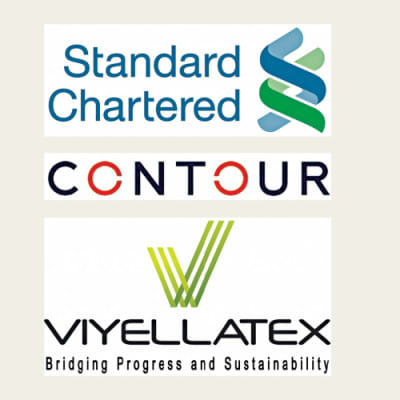StanChart executes Bangladesh’s first-ever blockchain LC transaction

Standard Chartered has executed the country's first-ever blockchain transaction by issuing a letter of credit for Viyellatex, in a development that can go on to make the process of trade, both at local and global levels, much streamlined.
"The whole process was smooth and hassle-free. It's like the transaction on a mobile financial service provider -- you made a transaction through SMS or an app," KM Rezaul Hasanat, chairman and chief executive officer of Viyellatex Group, a top garment exporter, told The Daily Star yesterday.
The entire transaction was paperless and completed digitally by Contour, a global network of banks, corporates and digital solutions, all on one connected decentralised platform leveraging Corda blockchain.
A blockchain is a database that is shared across a network of computers. Once a record has been added to the chain it is very difficult to change. To ensure all the copies of the database are the same, the network makes constant checks, according to Reuters.
Blockchains have been used to underpin cyber-currencies like bitcoin but many other possible uses in areas such as banking and supply chain are emerging.
Under the transaction, Viyellatex -- which exports $300 million worth of garment and textile items and counts Puma, S Oliver, Espirit, Marks and Spencer and Sainsbury among clients -- imported textile items from Viyellatex Spinning.
Standard Chartered acted as the issuing bank for the applicant as well as the advising bank for the beneficiary of the letter of credit (LC).
Most of the garment exporters source raw materials such as textiles and yarn as well as accessories locally through inland LCs, which involve tedious paperwork.
Normally, Viyellatex has to prepare an application requesting LC and an employee has to go to the bank with the printed application to hand it over.
A designated person from the supplier has to come to the bank as well to receive the copy of the order after the bank's scrutiny.
Later, the supplier submits an invoice after shipping the items and a person from Viyellatex has to obtain it. When Viyellatex gives a nod, the bank makes payment to the supplier.
With Contour, there will be no such paperwork and no need for bank visits. All parties -- buyers, banks, beneficiaries -- involved in the process can perform all tasks simply by logging on to Contour's network.
"It is not cumbersome like normal ones. Besides, it's time and cost-efficient," Hasanat said.
Built on R3's Corda blockchain, Contour provides a distributed trade network enabling an enhanced degree of collaboration across the main elements of trade with all participants leveraging the network to create and renew trade data in real-time.
"If you want to name the top five advantage of this, they are paperless, real-time, low-cost, faster and error-free," said Naser Ezaz Bijoy, CEO of Standard Chartered Bangladesh.
Although it has been done locally, Standard Chartered would soon expand the service for cross-border exports and imports, he said.
For that, everything will be paperless except for some regulatory processes of the Bangladesh Bank and customs formalities.
Contour improves data transparency, removes administration costs and reduces friction in global trade, all leading to an overall increase in efficiency and reduction in costs for all parties, Standard Chartered Bangladesh said in a press release.
As one of the founding members of Contour, the multinational bank benefits from the network, which simplifies the LC process, delivering shorter settlement times, instant discrepancy resolution and simplified sanctions screening.
"We are very excited to offer our clients improved speed and reduced risks of settlement offered by platforms such as Contour," Bijoy added.
The global trade lacks a solution that drives out inefficiencies, improves data transparency and enables interoperability between all trade participants, said Carl Wegner, CEO of Contour.
The long-established elements of trade finance don't have sufficient integration, causing friction and unnecessary administration.
These inevitably cause significant barriers for global trade growth, adding complexity, increasing cost and delaying the process for both banks and corporates, he added.
"The Contour network can overcome these issues, providing a consistent and reliable infrastructure for global trade to flourish, especially in countries like Bangladesh that count on LCs for a significant part of their trade volumes."
The recent transaction with Viyellatex serves to prove that a solution is out there and readily available for adoption, Wegner added.
This is not the only blockchain-based transaction that British lender has in store for its clients.
Standard Chartered is also rolling out a blockchain-based service for expatriate Bangladeshis in Malaysia, the fifth-highest source of remittance for the country, enabling them to send money home on a real-time basis.
"The service will be launched soon and we have partnered with a local MFS provider and a Malaysian company," Bijoy said.
As per the arrangement, remitters will be able to send in their hard-earned money in real-time by opening a mobile wallet with Malaysian fintech firm Valyou, a subsidiary of Telenor Group.
The amount from Valyou would then be wired through Standard Chartered's operations in Malaysia and Bangladesh. Once in Bangladesh, bKash would distribute the funds, ending the chain of cross-border transaction that harnesses the power of technology.
This means migrant workers in Malaysia would be able to settle their cross-boundary transactions in real-time with just a few clicks on their mobile phone, in an arrangement not seen before in Bangladesh.
Corda, the blockchain platform, would facilitate the transaction.
The platform, which was designed to bring transparency and trust to interactions while maintaining privacy and security, ensures data is shared only with the parties that need to know.

 For all latest news, follow The Daily Star's Google News channel.
For all latest news, follow The Daily Star's Google News channel. 



Comments